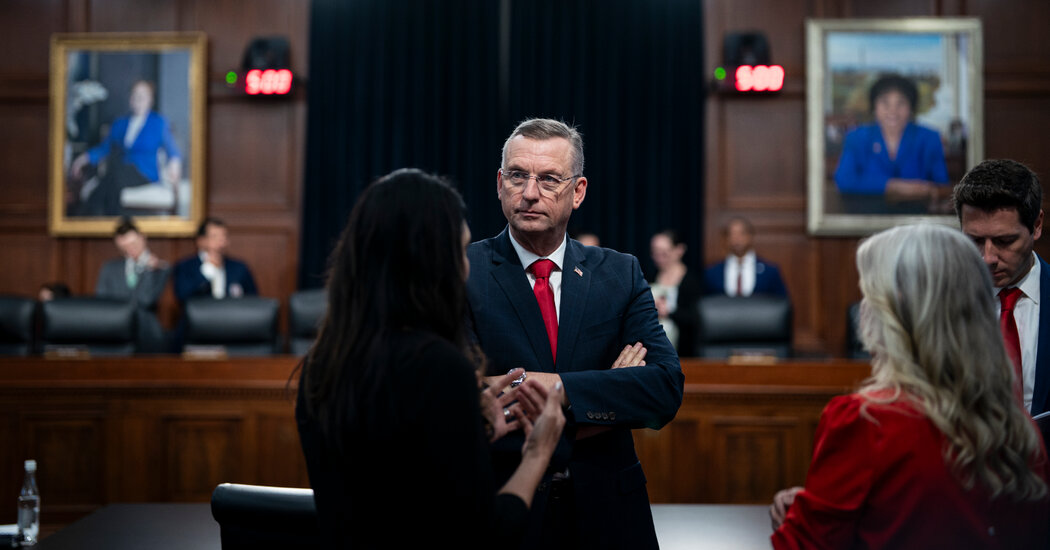TRANSCARPATHIA, Ukraine — Beneath dark clouds unleashing a summer rain, officials in a southwestern Ukrainian border village gathered silently, slowly hanging wreaths on branches to commemorate the destruction of a nation.
The wreaths were not decorated with the yellow and blue of the Ukrainian flag; they were laced, instead, with the red, white and green of Hungary’s. And the nation they honored this month was not their besieged country, but a homeland from their collective history, torn up more than 100 years ago.
Transcarpathia — now a hardscrabble region of Ukraine bordering Hungary — has been home to as many as 150,000 ethnic Hungarians who, through the complex horse-trading, conquests and boundary adjustments of over a century of European geopolitics, ended up within Ukraine’s borders.
Before the war with Russia, the yearnings of Ukraine’s Hungarian minority were mostly brushed off as benign nostalgia for a time when they lived in one nation with other ethnic Hungarians.Now, divided loyalties within the tiny community — which has soaked up Hungary’s ambivalence toward Russia’s invasion — are being seen as something more worrisome by their fellow Ukrainians, some of whom fear they are susceptible to pro-Russia propaganda from Hungary.
The ambivalence some feel is a reminder of the trouble that Hungary’s authoritarian leader, Viktor Orban, is able to cause for his neighbors, in this case by playing on ethnic Hungarians’ feelings of discrimination by their government. And it adds another layer of complexity for Ukraine’s leaders as they try to keep their sprawling, multiethnic country united in the face of a brutal Russian invasion, even as they struggle to win allegiance from minorities including ethnic Russians and Hungarians.
“It’s like being on a football field between two opposing teams,” said David Arpad, a pastor who was leading one of the commemorations for the lost Hungarian homeland, which were kept small to avoid stoking more tensions amid the war. “We are stuck on the middle of the field, because on one side is Hungary, and the other side is Ukraine.”
Hungary and Ukraine were not always rivals. In the final days of the Soviet Union, they were partners in nationalist struggles for more self-determination. Hungary was among the first countries to recognize Ukraine, in exchange for ethnic Hungarians within Ukraine’s borders having the right to preserve their language and culture.
But in recent years, tensions have risen as Mr. Orban has increasingly sought to bring ethnic Hungarian enclaves in Ukraine and elsewhere under his sway. Among other things, he has encouraged Hungarians beyond the country’s borders to claim citizenship, which allowed him to win over new voters to keep him in power.
Better Understand the Russia-Ukraine War
- History and Background: Here’s what to know about Russia and Ukraine’s relationship and the causes of the conflict.
- How the Battle Is Unfolding: Russian and Ukrainian forces are using a bevy of weapons as a deadly war of attrition grinds on in eastern Ukraine.
- Outside Pressures: Governments, sports organizations and businesses are taking steps to punish Russia. Here are some of the sanctions adopted so far and a list of companies that have pulled out of the country.
- Stay Updated: To receive the latest updates on the war in your inbox, sign up here. The Times has also launched a Telegram channel to make its journalism more accessible around the world.
In this poor region of Ukraine, along the Hungarian border, he doled out funding to run schools, churches, businesses and newspapers, winning gratitude — and helping fan resentments. The ceremony for a lost homeland did not exist before Mr. Orban came to power.
The feelings of otherness intensified as Ukraine, under constant threat by Russia, passed a law that mandates more classes be taught in Ukrainian in public schools. The law was mainly meant to rein in the use of the Russian language, but for the conservative Hungarian community where many still learn, and pray, almost exclusively in Hungarian, the law was seen as an unfair infringement on constitutional rights.
Among the villages dotting the rolling green plains beneath the Carpathian Mountains, life has long been a mix of Hungarian and Ukrainian influences. Not even the time of day is certain. For locals, there are always two choices for setting a meeting: Kyiv time or Budapest time.
During the war, the kinship with Hungary has contributed to differences over who is at fault. Despite his country’s membership in the European Union, which has firmly sided with Ukraine, Mr. Orban — President Vladimir V. Putin’s closest ally in the bloc — has equivocated, condemning the invasion but trying to avoid antagonizing Mr. Putin. He tried to block European Union sanctions on Russian energy imports, on which Hungary relies. And he declined to give weapons to Ukraine, or even allow them to be shipped across Hungary’s borders.
That wariness has seeped into the ethnic Hungarian community, fed by Hungarian television channels close to Mr. Orban’s governing party that broadcast into Hungarian-Ukrainian homes along the border. Hungarian broadcasters cast doubt on Ukraine’s position that Russia invaded to steal Ukrainian land, instead sharing Moscow’s perspective that it invaded to protect Russian speakers — a minority with a different language, not unlike the ethnic Hungarians.
“I think this is the main reason for the war, not what Ukraine says,” said Gyula Fodor, a vice rector at the Transcarpathian Hungarian Institute, chatting over traditional plum schnapps after the ceremony for the lost homeland. The institute, a private college, has received Hungarian funding, and Mr. Orban attended its ribbon-cutting.
As the war has dragged on, relations between Mr. Orban and President Volodymyr Zelensky of Ukraine have grown increasingly frosty.
In the border towns, suspicion is in the air. Some ethnic Ukrainians claimed during interviews that in the first days of Russia’s invasion Hungarian priests had urged the faithful to hold out hope that their region would be annexed to Hungary after Kyiv, the capital of Ukraine, fell, though there is no documentary evidence to substantiate those assertions.
In towns with ethnic Hungarian majorities, some people reported being harassed with mysterious text messages in Ukrainian: “Ukraine for Ukrainians. Glory to the nation! Death to enemies!” They said the messages ended with a threat using another word for ethnic Hungarians: “Magyars to the knives.”
Ukrainian intelligence officials publicly claim the texts came from a bot farm in Odesa using Russian software, and labeled it a Russian attempt to destabilize Ukraine, but they did not provide evidence.
Tensions in Transcarpathia erupted publicly after Moscow’s annexation of Crimea in 2014. Right-wing nationalists marched through the streets of Uzhhorod in recent years, sometimes chanting “Magyars to the knife.”
And a Hungarian cultural center in the city of Uzhhorod was set ablaze twice in 2017. In both cases, authorities said the perpetrators had pro-Russian links. Dmytro Tuzhankskyi, the director of the Institute for Central European Strategy in Uzhhorod that promotes Ukraine’s alignment with the West, says he believes Moscow was behind other local provocations. Moscow would like to sow discord between Hungary and Ukraine, he alleged, as a way of causing more trouble for the Western alliance that has lined up against Mr. Putin.
Hungarian and local officials, he worried, could unwittingly fall prey to such designs: “They might think: One more little provocation — it means nothing. That’s a very dangerous mind-set.”
Yet for many ethnic Hungarians, Ukraine is not blameless.
László Zubánics, the leader of the Hungarian Democratic Union of Ukraine, said locals watch Hungarian television partly because no Ukrainian cable channels reach the border areas, something he saw as a form of political neglect. But he acknowledged that ethnic Hungarians often choose to tune into Hungarian, and not Ukrainian, satellite channels.
Many ethnic Hungarians say they are only able to afford to stay in the region of family vineyards and farms because of Hungarian funding. That makes many ethnic Hungarians skeptical of Ukraine’s claims that it wants to help integrate them into society, Mr. Zubánics said: “Most kids and parents say, ‘Why do I need the state language? I don’t see my place here in this country.’”
Although the Soviets repressed and exiled Hungarian nationalists, some ethnic Hungarians have started to look back on Soviet rule as a time of relative cultural freedom as well. It was a time, according to Mr. Zubánics, when Hungarians recall holding prominent official positions, unlike in modern Ukraine.
Nostalgia for Soviet times stirs the ire of local right-wing nationalists such as Vasyl Vovkunovich, once a political ally of Hungarian nationalists in the final days of the Soviet Union. In 2017, he said he led a march of supporters down the streets of Berehove, ripping down Hungarian flags raised over many churches and buildings.
“These Hungarians are not worthy,” he said. “Their ancestors would roll over in their graves if they knew Hungary was siding with Russia.”
For local residents like Zoltan Kazmér, 32, the present feels more complicated. He feels loyal to Ukraine, he said. But it was Hungarian funding that allowed him to turn his family’s century-old winemaking tradition into a business.
“When we go to Hungary, we feel like Ukrainians,” he said. “When we are in Ukraine, we feel like Hungarians.”

